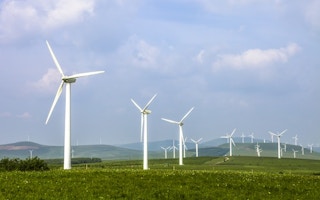A new global climate change deal, due to be agreed in Paris in December, must give clear guidance that moving away from fossil fuels is inevitable and wise, economists said on Friday.
It must also usher in an era when governments, businesses, activists and citizens find innovative ways to make that shift happen, experts told a Paris meeting of climate scientists.
“Paris will not solve all, of course,” said Laurence Tubiana, France’s ambassador to the UN climate talks. “But we have to have every actor believing … that a low-carbon resilient economy is the future.”
“Coalitions of the working” on climate-related issues such as protecting forests and pricing carbon are already making progress and “moving ahead of the general consensus” in the UN negotiating halls, said Rachel Kyte, vice president of the World Bank and its climate change envoy.
Effective action on climate change requires a new global deal, but may be built best by the most willing coming together and creating incentives for others to join them, Tubiana said.
“We have no top-down solution,” she emphasised. That means the Paris gathering will need to find fresh ways to cobble together efforts by governments, business, religious leaders, non-governmental groups and others, she said.
The change required is nothing less than the “induced implosion of the carbon economy”, said Hans Joachim Schellnhuber, director of the Potsdam Institute for Climate Impact Research.
Without that, “we have not the slightest chance of avoiding dangerous, maybe disastrous climate change”, he warned.
‘A moral decision’
Transformation will be led not by a new UN climate deal, he and others said, but by influential leaders constructing a broad social movement against climate change, fashioned on movements like the one that ended the international slave trade.
Momentum is starting to build now - from Pope Francis’ influential call for action on climate change as a moral obligation, to the international fossil fuel divestment campaign and the Group of Seven (G7) countries’ commitment to achieve a low-carbon global economy.
“In the end I think it’s a moral decision whether we want to get this transformation going over the next decades or not. This is about a global social movement,” Schellnhuber said.
The final day of the Paris conference focused heavily on the limitations of science in driving action to tackle climate change, and the need to find new ways of dealing with the problem.
Schellnhuber said the process of the Intergovernmental Panel on Climate Change producing science reports every seven years was outdated. A shorter cycle was needed and the evidence was already compelling, he added.
“The scientist who knows absolutely enough about the risk we face should be willing to make recommendations now,” he said.
Richest billion must act
He and Kyte emphasised that the costs of the coming economic transition away from fossil fuels should be paid by the world’s rich rather than being shared with the poorest.
“The bottom billion people don’t contribute at all to climate change - maybe 1 percent of emissions,” Schellnhuber said. “They could double or triple their emissions and the climate would not be destabilised.”
It is the billion richest people who need to change their behaviour, he said. “This message needs to come out loud and clear in Paris,” he added.
Kyte said the need to “immediately and urgently” find a way to support the world’s most vulnerable people - who are already facing more extreme weather and other climate impacts - remained a “missing piece” in any new global climate deal.
Getting a promised $100 billion a year by 2020 in climate finance flowing to developing countries was one part of the puzzle to be solved at the Paris negotiations, she said.
On Thursday, a coalition of the world’s biggest development banks, including the World Bank, announced they had agreed on a common approach to determine what counts as climate adaptation funding, and to track how it is raised and spent.
A similar consensus was reached earlier on measuring spending to reduce climate-changing emissions.
Right now “nobody believes anybody else’s numbers”, and “lack of trust bedevils the process”, Kyte said.
Making it clearer which governments are meeting their obligations, who is getting the money and if it is being spent well will be key to ensuring finance is scaled up, she added.










